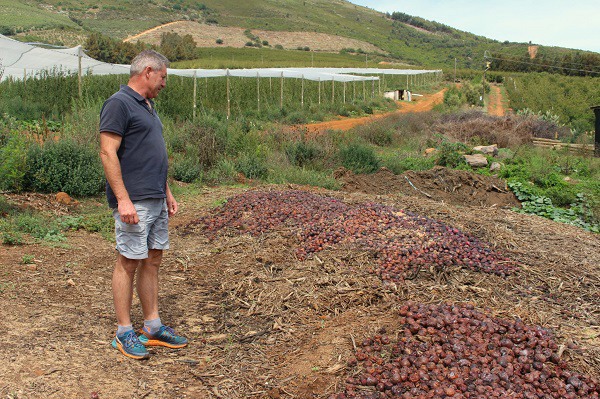The South African fruit industry is investigating the possibility of a partial privatisation of Cape Town's harbour, with a loading zone only for fresh produce.
In its latest newsletter, the deciduous fruit industry body Hortgro features a plum farmer at the compost heap where his plums that have become too old for exports, have been dumped.
Loading on breakbulk vessels from the private terminal at the port of Cape Town are unaffordable for producers struggling to keep head above water, he observes.
André le Grange, a stonefruit farmer outside Stellenbosch, told Hortgro that he blames delays at the port of Cape Town for rejections of plums older than thirty days when it was received in Europe. He notes that on the farm, his employees manage to pick, pack and cool fruit within 48 hours, only to see it go awry between the farm gate and the ship. He says he's ready to take the overripe fruit to the port in protest.
 André le Grange with export plums now consigned to the compost heap (photo used with kind permission by Hortgro)
André le Grange with export plums now consigned to the compost heap (photo used with kind permission by Hortgro)
Hortgro estimates that 13.45 million 5.25kg cartons of plums will be exported this year, compared to 15.46 million cartons last year, a drop of 14%.
"The industry is stagnating and shrinking all along the cost chain," he tells Hortgro. This would be the second consecutive year in which stonefruit producers are subjected to operational problems at the harbour which, he says, pose an existential threat to the fruit industry.
At the recent Citrus Growers' Association citrus summit, managing director of a stonefruit exporting company demanded the resignation of the CEO of state-owned ports company Transnet, Portia Derby, who had just delivered an address.
A citrus industry source says the incident was highly upsetting to both Ms Derby, who had delivered an "honest and transparent" address to the citrus industry, outlining the difficult environment within which Transnet itself operates, and to the Citrus Growers Association who have distanced themselves from the stonefruit exporter's utterances and apologised to the Transnet CEO.
The increasingly outspoken criticism of Transnet calls to mind a leaked letter in January by the Minerals Council of South Africa (representing mining employers) in which they too were allegedly asking the Transnet board for her dismissal.
The fruit industry has weekly consultations with Transnet, but the feeling among producers, the newsletter notes, is increasingly that diplomacy now has to translate into concrete actions before more farms are forced to close their doors.










